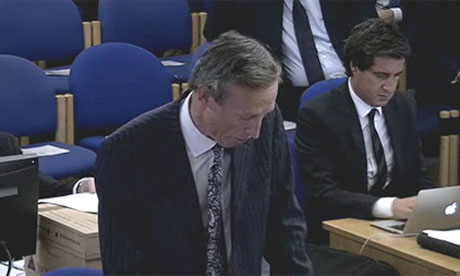News International's barrister asks inquiry to check counsel's statement and admits hacking could have continued after 2007

News International's barrister Rhodri Davies addresses the Leveson inquiry into phone hacking
The News of the World's former owner has disputed whether there is evidence that 28 of the paper's employees commissioned a private investigator to hack into mobile phones.
News International's barrister, Rhodri Davies QC, told the Leveson inquiry into press standards at the high court on Tuesday that the company "would like to have this information rechecked".
Davies also said the company now accepted that phone hacking "was not the work of a single rogue reporter". The practice was "wrong", "shameful" and "should never have happened", he said.
"The News of the World managed to plumb both the depths and the heights," he added. "The depths, I need hardly say, are taken up by phone hacking."
The inquiry heard on Monday that the names of at least 28 News International employees – former royal editor Clive Goodman and 27 others – were written in the page corners of notebooks belonging to Glenn Mulcaire, the private investigator jailed in January 2007 for intercepting voicemail messages on behalf of the News of the World. That suggests the practice was employed by far more than a handful of News of the World journalists, as the company has claimed.
Davies said that the statement, by the inquiry's counsel Robert Jay, "has occasioned some surprise on our side".
He added that Jay had referred to "at least 27 other NI [News International] employees … this is a context where NI means the News of the World".
News International was aware that five News of the World journalists were named in the notes – Goodman, who was jailed along with Mulcaire in January 2007, and four others, who Davies did not name.
Davies said the company believed Scotland Yard had also identified the names of other News of the World staff in Mulcaire's notes but "our understanding is it does not add up to 27".
"We have never seen the whole set of Mulcaire notebooks," Davies pointed out. "I believe the only people who have are the police."
The inquiry was told on Monday that four individuals at the News of the World instructed Mulcaire to carry out 2,143 out of a total of 2,266 "taskings" the investigator conducted for the paper.
Several jobs were commissioned by names that are ineligible, while others were marked "private" by Mulcaire. Goodman also requested some of those taskings.
Davies expressed surprise that the remaining 123 "taskings" could have been requested by as many as 21 other News of the World staff. But he added: "2,266 taskings is 2,266 too many."
He also said that the Sun "disputed" a claim brought against the paper by actor Jude Law, who is also suing the News of the World for breach of privacy, but added that he could not go into detail because of confidentiality rules imposed by the judge who is hearing the case.
Davies told that inquiry hearing that, following Goodman and Mulcaire's jailing in 2007, the paper had put its house in order. While he could not guarantee that no phone hacking took place after that date, he said: "If phone hacking continued after that it was not … the thriving cottage industry which existed beforehand."
He added that the decision to place MPs on the Commons culture, media and sport committee and lawyers representing alleged victims of hacking under surveillance was "unacceptable", saying "it wasn't journalism at all".
The inquiry also heard on Tuesday from Jonathan Caplan QC, for Daily Mail owner Associated Newspapers.
Caplan warned Leveson against putting forward changes to the current system of press regulation based on what had happened in the industry in the recent past.
"We need to be clearly aware that any recommendations … are not simply introduced on the basis of historic transgressions which no longer occur," he said. Caplan added that as far as the publisher was aware: "No journalist at Associated Newspapers has engaged in phone hacking."
Addressing the use of Steve Whittamore, another private investigator who was the subject of a police investigation, and who was used by the Daily Mail, he said there was no evidence that its journalists had asked him to do anything illegal.
Whittamore had mostly been asked to obtain telephone numbers that were already publicly available by busy journalists who did not have the time to find them, Caplan added. "There simply is no evidence that they ever asked Mr Whittamore to do anything illegal."
The private investigator was also used by several other national newspapers, including the Observer, the Guardian's sister paper.
http://www.guardian.co.uk/media/2011/nov/15/leveson-inquiry-now-phone-hacking?CMP=twt_gu
